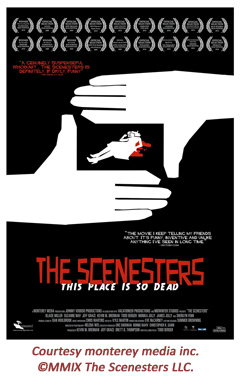 Film: The Scenesters (monterey media 2011)
Film: The Scenesters (monterey media 2011)
Genre: Drama, comedy
Writer/director: Todd Berger
Cast: Sherilyn Fenn, Blaise Miller, Todd Berger, Jeff Grace, Kevin M. Brennan, James Jolly, Monika Jolly, and Suzanne May
?In front of you is an exciting, even dangerous life, but while watching it you feel safe. In this sense the film theatre is a harbour in which to enjoy the turmoil and the storm around you. You are living the storm, but you are in the harbour.?
Francesco Casetti in an interview with Wanda Waterman
?As machines get to be more and more like men, men will come to be more like machines.?
Joseph Wood Krutch
The Illusory Safety of the Hollywood Dream Machine
In Eye of the Century, Francesco Casetti reveals to us the role of film in everyday life: film reflects our difficulties and presents us with solutions to help us cope with our conflicts and negotiate cultural change. Understandably, film will often comment on its own role or on the role of technology.
The Scenesters is the second film in a row that I’ve reviewed involving a film within a film (a film about the circumstances surrounding the making of another movie), in which the debate is clearly the relationship between the story being told in the film and the reality unfolding around the film’s creation. Is there a pattern here? Is postmodern culture experiencing a blurring of the line between film and reality?
Small-time film producer Wallace Cotton has had the funding pulled on his latest project, so he gets a job with the police department, filming crime scenes.
Wallace meets a crime scene clean-up man named Charlie Newton, who in spite of being a bit of a loser has an amazing ability to detect and process clues that the police miss. It’s an opportunity that can’t be missed: Wallace decides to make, unbelievably, a film noir documentary with Charlie as the star.
In its own casual and sardonic way The Scenesters shows up where we are in the conflict between the reality of Los Angeles life and the many film approaches to interpreting that life and life in general.
Except for the ridiculously incongruous appearance of Charlie Newton, the noir scenes are so juicy and evocative you want to forget that this is a comedy and just dive right in and take it all seriously. They are almost the only visually and aurally engaging scenes in the film, but they’re all you need, creating a lovely contrast with the jerky camera work and gritty realism of the rest of the movie.
Wallace ends up bringing along his whole film crew and eventually staging his own ?reality? scenes because they fit his film’s agenda. Meanwhile, the film crew happily helps itself to whatever they find in the refrigerators of the murder victims while playing their video games and listening to their CDs.
In LA everything relates back to film somehow: everyone wants to be on film, to be recognized, to participate in this medium that seems realer than real, to live their lives as if they are perpetually on camera. And those in the film industry can be so smug, narcissistic, and liberally amoral that the comedic potential is vast.
As in Even the Rain, modern liberals here are mocked for their bizarre ethical codes that seem to be slapped like new paint on top of rotting moral characters. While showing no compassion for the murder victims (?Look, he only kills women, all right? So let’s not lose focus.?), they remain sticklers about political correctness:
?Okay, what do we know about this killer??
?Well, he’s probably a white male in his 40s.?
?Okay, we need to put the brakes on the whole racist thing right now.?
The dream world from which the biggest box office successes emerge is presented in all its hazy, gravelly, sagebrushy ugliness that simply sings with the horrendous architecture and interior decor. But California is still the land where you can wish upon a star and someday your prince will come, so of course loser Charlie is implausibly hooked up with a gorgeous newscaster who adores him.
To add to the fun, the film is a showcase for some really good East LA musical acts that form the soundtrack and which are also key props in the story.
And to top it all off, you’ll never guess who the killer is.
The Scenesters manifests three of The Mindful Bard’s criteria for films well worth seeing: 1) It provides respite from a sick and cruel world, a respite enabling me to renew myself for a return to mindful artistic endeavour; 2) it is authentic, original, and delightful; and 3) it makes me appreciate that life is a complex and rare phenomenon, making living a unique opportunity.


